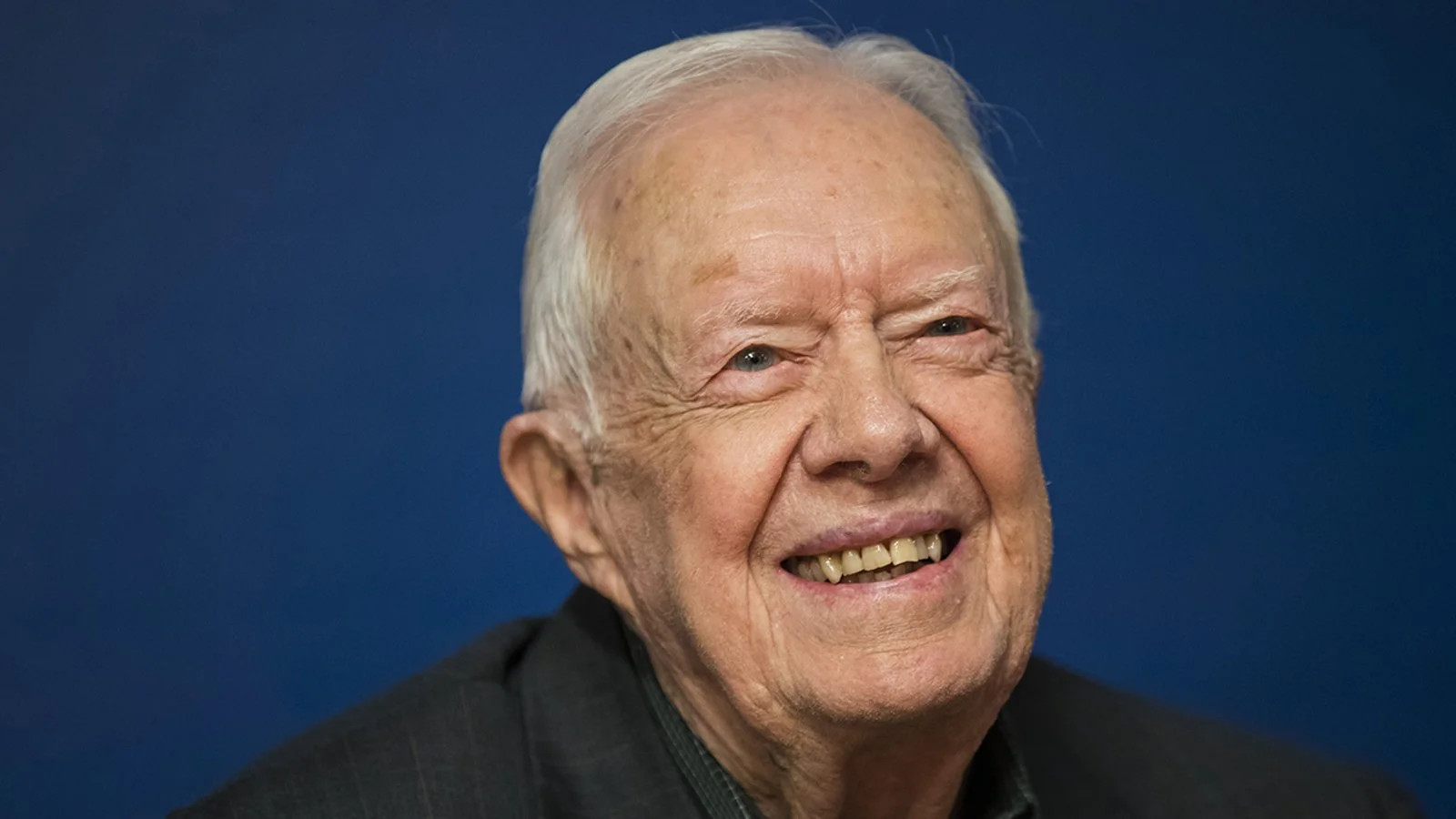Jimmy Carter: The Life and Legacy of an American Statesman
Photo via Getty Images
ZACHARY FOTIADIS: On February 18, 2023, President Jimmy Carter announced his intention to formally retire from public life and enter hospice care at his home in Plains, Georgia. Among the longest-living former heads of state, the 98-year-old’s decades of service are a testament to a life well-lived. A soldier, peanut farmer, politician, and humanitarian, Carter wore many hats and made his mark on the world in more ways than one.
Born on October 1, 1924, James Earl Carter, Jr. was the oldest of four children all raised on the family peanut farm in Plains. A 1946 graduate of the United States Naval Academy, Carter served as an active-duty naval officer for several years, receiving a number of accolades for his valor. He met and married Rosalynn Smith during this period; their 77-year union remains the longest of any presidential couple. His military career was cut short by his father’s death in 1953, prompting his return to Plains to take over the peanut business. Despite a series of crippling droughts and near bankruptcy, Carter triumphed in the face of adversity and built the farm into a highly lucrative enterprise.
Carter’s political ambitions began with his successful election to the Georgia State Senate in 1962. After a failed bid for governor in 1966, Carter tried again four years later, with the second time proving a charm. Inflamed racial tensions plagued the immediate post-civil rights political landscape in Georgia, some of which the Carter campaign exploited to court Southern white voters. However, he would quickly establish a reputation for being a staunch supporter of racial reconciliation and social reform, explicitly condemning the state’s segregationist past in his inaugural address.
Constitutionally ineligible from serving a second term as governor, Carter decided to shoot for the big leagues, declaring his candidacy for President of the United States in late 1974. Carter was from the Deep South and had virtually nonexistent name recognition outside his home state; naturally, many in the political mainstream viewed his chances of victory as slim to none. Defying the odds, he emerged from a crowded field to win the Democratic Party’s nomination and went on to defeat Republican incumbent Gerald Ford in November of 1976. Portraying himself as a humble outsider from the countryside “untainted” by Washington, his public image appealed to an America dissatisfied with politics as usual in the wake of the Watergate scandal.
Swearing the oath of office on January 20, 1977, Carter immediately sought to restructure the nature of the presidency and advance an ambitious legislative agenda. He solidified his anti-Washington credentials by assembling a cabinet largely composed of fellow outsiders. Despite his contemporary reputation as an uncompromising liberal, Carter governed as perhaps the most moderate Democratic president of the 20th century apart from Bill Clinton. His domestic politics fused pre-New Deal progressive era administrative reform with a semi-conservative economic policy. While he oversaw the creation of two new executive bureaucracies (the Departments of Energy and Education) as well as spearheaded one of the first federal renewable power initiatives, he was a vociferous advocate of deficit reduction and fully privatized the airline, trucking, and rail industries.
Carter’s profound religious faith has always been a defining feature of his character and career. Among our nation’s most overtly evangelical chief executives, his Baptist principles manifested most clearly in his foreign policy. The Carter Doctrine marked a partial transition away from the aggressively anti-communist realpolitik approach of preceding administrations to an active prioritization of human rights. He terminated relations with the authoritarian Somoza regime in Nicaragua, cut back aid to dictatorships in Chile, Argentina, and Brazil, and transferred control over the Panama Canal to its host country. He became the first sitting president to visit Sub-Saharan Africa and successfully pushed for a United Nations arms embargo against apartheid South Africa and white supremacist Rhodesia. He unofficially recognized Taiwan and sought another arms reduction agreement with the Soviet Union. Among the highlights of his presidency was negotiating the Camp David Accords, which returned the Sinai Peninsula to Egypt in exchange for it becoming the first Arab nation to recognize the State of Israel.
The Carter Administration endured a number of setbacks. Record-high levels of monetary inflation combined with sluggish economic growth and high unemployment culminated in a unique phenomenon known as Stagflation. The Three Mile Island nuclear power plant accident combined with the 1979 Oil Shock dramatically reduced confidence in the American energy market. Both the Soviet invasion of Afghanistan and the Iran Hostage Crisis damaged the electorate’s faith in Carter. All of this contributed to his landslide defeat at the hands of Ronald Reagan in 1980.
Despite the mixed ratings his presidency has received from historians, Carter’s extensive activity since leaving office has drawn considerably more attention. He and his wife remained long-standing volunteers with the organization Habitat for Humanity up until this year, helping build shelters for impoverished families across the globe. He and Rosalynn also founded the Carter Center in 1982, among the world’s leading humanitarian relief associations and election monitors pioneering the eradication of viral infections like Guinea worm disease. He was the recipient of the 2002 Nobel Peace Prize for his efforts with the group. His busy schedule only seldom prevented him from delivering a Sunday sermon every week back in Plains. Spanning over 42 years, Carter maintains by far the longest post-presidency.
Having lived a life of public service and triumph over challenges informed by devoted faith in God, President Jimmy Carter is a true American statesman. His legacy has been felt by countless across borders and time zones. There is little doubt he has secured himself a permanent place in history.
Zach Fotiadis is a staff writer for On the Record originally from Miami, Florida. He is currently a junior in the School of Foreign Service studying International Politics with a minor in history.

